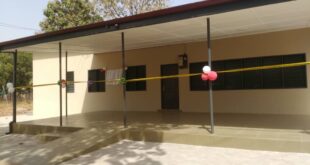Yendi, Ghana – The rise of Violent Extremist Organizations (VEOs) in the Sahel region is casting a shadow over parts of West Africa, including Ghana’s Northern regions.
Despite Ghana’s resilience to these threats so far, several destabilizing factors threaten this fragile peace.
Limited state service delivery, a lack of economic opportunities, and deep-rooted ethnic tensions create fertile ground for extremist influence.
To counter these risks, the Coastal States Stability Mechanism (CSSM) , a multi-year joint initiative by the United States and Germany, is working to bolster stability in Ghana’s vulnerable northern regions.
The initiative is based on the belief that the cost of inaction is too high, as future security, humanitarian, and development needs would likely escalate if current issues are not addressed.
It is part of a larger U.S. Strategy to Prevent Conflict and Promote Stability and is closely aligned with Germany’s integrated approach to peace. By investing in conflict prevention and building local capacity, CSSM aims to reduce the long-term need for costly security interventions and humanitarian assistance.
“ It takes a group like ours with strong partnership amongst international, national, regional and local actors to affect peace and stability. At the core of CSSM in Ghana lies the partnership between the Ghanaian government and the national and the local level, and you the people of Chereponi as well as Germany, our US colleagues and the United Nations represented by IOM” said Deiko Potzel, Director General for Crisis Prevention, Stabilization, Peacebuilding and Humanitarian Assistance at the German Federal Foreign Office.
CSSM operates with a focus on prevention, reinforcing the presence of the state and building trust with local communities. It is driven by a critical assumption: that investing in stability now will reduce future costs associated with security interventions, humanitarian crises, and development needs. The initiative’s approach combines support for civilian security, social cohesion, and improved service delivery.
“CSSM is a community centered approach to conflict prevention. We are looking for more integrated approaches connecting security efforts with improved governance, delivery of services and trust building with local communities. It reflects our goal that we need inclusive processes for long term stability” said Anne Witkowsky, the Assistant Secretary at the Bureau of Conflict & Stabilization Operations in the United States Department of State.
The Chereponi District, located near the Togo border, and home to around 90,000 people served as a pilot area of focus for the CSSM project. Chereponi has faced longstanding communal conflicts tied to land disputes and ethnic tensions, which have disrupted daily life and hindered access to essential services and during the launch in Yendi, findings and efforts undertaken in the piloting period were discussed.
The collaborative process in Chereponi led to a shared vision for improving security and trust between the community and local authorities. One of the pressing issues identified was the lack of public trust in the under-resourced security forces, especially amid incidents of armed robbery and the spread of illegal firearms. Among the identified priorities was the need to strengthen the local police force. CSSM provided much-needed equipment and repaired the district’s only active police station, which had suffered from under-resourcing. Some of the operational equipment as revealed by ASP Mohammed Nasir, the Chereponi District Police Commander included body cams, body armors, binocular devices and flashlights.
CSSM’s work in Chereponi is just the beginning. The initiative plans to expand its activities to other districts in Ghana’s Savannah and Upper West Regions, with an eye towards eventually reaching the Upper East Region. This strategic expansion is guided by Ghanaian government priorities and aims to adapt to changing security dynamics on the ground.
By SavannahOnline.Com/Sam Ell
 Savannah News Online Reporting Only What Matters Most
Savannah News Online Reporting Only What Matters Most



